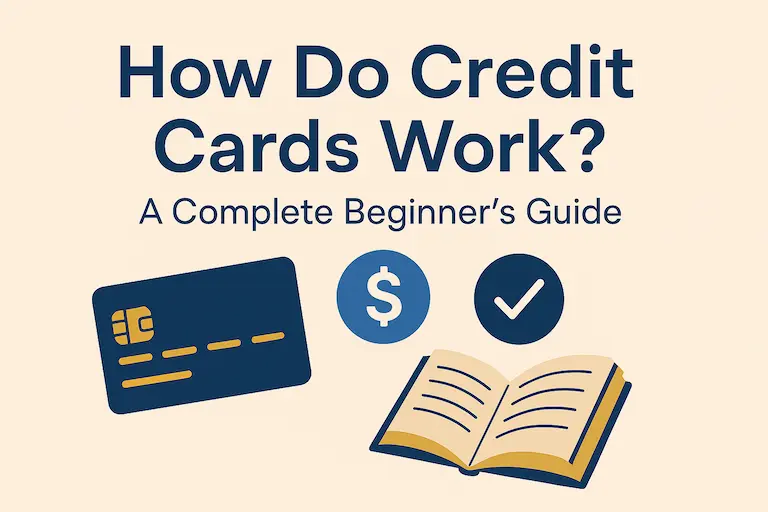
Introduction
Credit cards are powerful financial tools that can help you build credit, manage your expenses, and even earn rewards. However, without a proper understanding of how they work, they can also lead to debt and financial stress. In this beginner-friendly guide, we’ll explore how credit cards work, explain important concepts like interest, fees, and payments, and help you use your card wisely.
What Is a Credit Card?
A credit card is a payment tool issued by a bank or financial institution that allows you to borrow money to make purchases. Unlike debit cards, which pull funds directly from your bank account, credit cards let you borrow money that you must pay back later.
How Credit Cards Work
- Opening an Account: To get a credit card, you must apply for one, often through your bank. Once approved, you receive a credit limit, which is the maximum amount you can borrow.
- Making Purchases: You can use your card to make purchases in stores or online, up to your credit limit.
- Monthly Statements: At the end of each billing cycle, your bank sends you a statement listing all purchases, fees, and your current balance.
- Payments: You must pay at least the minimum amount due each month. You can pay the full balance or carry it over (which incurs interest).
Key Terms to Know
- Balance: The amount you owe on your card.
- Credit Limit: The maximum amount you can borrow.
- Interest: The cost of borrowing money, typically shown as an APR (Annual Percentage Rate).
- Payment: The amount you pay toward your balance.
- Payment Due Date: The date by which you must make a payment.
- Minimum Payment: The smallest amount you must pay to avoid late fees.
- Fees: Charges such as annual fees, late payment fees, and foreign transaction fees.
Interest: How It Works
Interest is the cost of borrowing money. If you don’t pay your full balance by the due date, your bank charges interest on the remaining balance. The longer you carry a balance, the more interest you’ll pay.
Example:
If you have a $1,000 balance with a 20% APR and you only make the minimum payment, you could end up paying hundreds in interest over time.
Common Credit Card Fees
- Annual Fee: A yearly charge for using the card.
- Late Payment Fee: Charged if you miss a payment.
- Balance Transfer Fee: Charged when you move debt from one card to another.
- Cash Advance Fee: A fee for withdrawing cash using your card.
- Foreign Transaction Fee: A fee for purchases made in a foreign currency.
Credit Card and Credit Score
Using a credit card wisely helps build your credit score, which lenders use to determine your trustworthiness.
- Payment History (35% of score): Always pay on time.
- Credit Utilization (30%): Keep your balance low compared to your credit limit.
- Length of Credit History (15%): The longer, the better.
- Credit Mix & New Credit (20%): Variety and fewer new accounts are better.
Tips to Use Your Credit Card Wisely
- Pay your full balance every month to avoid interest.
- Never miss a payment. Set up reminders or auto-pay.
- Monitor your account for fraud or errors.
- Don’t max out your card. Keep your balance under 30% of your limit.
- Use rewards and cashback programs to your advantage.
Cash Advances: Proceed with Caution
A cash advance allows you to withdraw cash from your card, but it usually comes with high fees and interest rates. There is also no grace period, meaning interest starts accruing immediately.
Are Credit Cards a Way to Make Money?
Some people use credit cards strategically to make money through rewards, cashback, and sign-up bonuses. But this only works if you pay your balance in full and avoid interest and fees.
Choosing the Right Credit Card
When selecting a credit card, consider:
- Interest Rates (APR)
- Rewards Programs
- Annual Fees
- Introductory Offers
- Customer Support and Mobile App
Educational Resource Recommendation
For a deeper dive into how credit works, we recommend:
“Your Score: An Insider’s Secrets to Understanding, Controlling, and Protecting Your Credit Score” by Anthony Davenport
👉 Buy it on Amazon
Formats and Prices:
- Kindle: $10.99
- Audiobook: $0.00 with Audible trial
- Paperback: $15.29
- Hardcover: $24.99
This book is perfect for beginners who want to better understand their credit and how to improve it through smart credit card usage.
Conclusion
Understanding how credit cards work is the first step to mastering your finances. By knowing how interest, fees, payments, and credit scores work, you can make smart choices that help you save money, build credit, and reach your financial goals. Remember, credit cards are tools — use them wisely, and they can work for you.
This book seems like a great resource for anyone just starting to navigate the world of credit. I appreciate how it focuses on practical tips for improving credit scores through smart credit card use. It’s refreshing to see a guide that simplifies such a complex topic. Do you think it covers strategies for people with no credit history at all? I’m curious if it also addresses common mistakes beginners should avoid. The emphasis on “smart usage” makes me wonder if it includes budgeting tips alongside credit advice. Would you recommend this to someone who’s already struggling with debt?